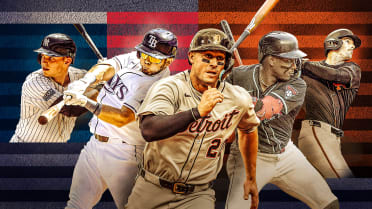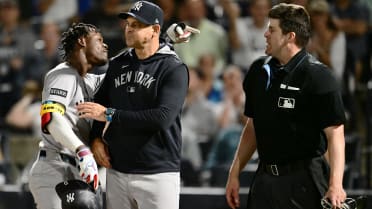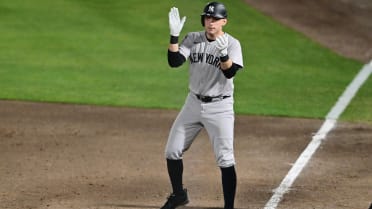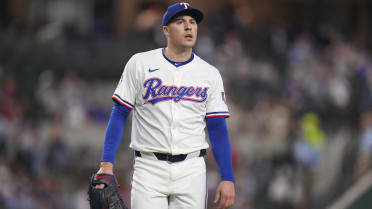PORT ST. LUCIE, Fla. -- Late one night last May, in a conversation no one particularly wanted to have, Mets leaders huddled to decide whether to demote struggling first baseman Ike Davis to the Minors. Other than Davis, the only player present was David Wright, who felt obligated to support his teammate if the decision went against him.
"He cares," Davis said. "Often, superstars probably wouldn't be there."
Wright is indeed the superstar who cares. He is Captain America. He is the man Fred Wilpon would want his daughter to marry. He is also now captain of Wilpon's franchise, the Mets. The organization officially bestowed that honor upon him Thursday afternoon, naming Wright the fourth captain in franchise history and the third active captain in the Majors.
"This is probably one of the proudest days of my career so far," Wright said. "I'm honored and very proud to be on that short list of guys that have been considered captain of this franchise. For me, it's a dream come true, to say the least."
Wright joins Keith Hernandez, Gary Carter and John Franco as the only captains in franchise history, and Paul Konerko of the White Sox and Derek Jeter of the Yankees as the only active captains. Like Jeter and Konerko, Wright will not wear a "C" on his uniform, a gesture symbolic in its subtlety.
Never a vocal leader, Wright does not plan to become one now. He will not transform into "a real rah-rah, yell-and-scream type guy." The third baseman instead prefers to conduct his leadership business in private, be it supporting Davis late one night in May, taking a struggling teammate out to lunch or talking shop with ownership.
"David is not a guy who wears it on his sleeve, which probably relates to the 'C' on the uniform and the fact that it won't be there," general manager Sandy Alderson said. "I don't think David needs it. I don't think that fits his personality. He's not somebody who is a captain in title alone. It's really about the substance underneath the title."
In Alderson's estimation, captainship requires two characteristics: professional expertise and personal character. Without the former, Alderson said, a captain has no credibility. Without the latter, he has no respect.
Wright embodies both. He has asserted his professional expertise with six All-Star selections, two Gold Gloves and two Silver Sluggers, establishing himself years ago as one of the best third basemen in the National League. He has also gained recognition as a leader, most notably earning his "Captain America" moniker during this month's World Baseball Classic.
Earning captainship in a more formal sense, Franco said, "is a sign of respect and a sign that the players on the team hold you in high esteem."
"I have been around David long enough to know that he is the perfect guy to be the captain of the Mets," Hernandez added.
In his new role, Wright will assume a measure of responsibility from manager Terry Collins, who required Wright to clear his new title with his peers. Wright did, going around the clubhouse and asking his teammates -- many of them friends, some professional acquaintances -- if they would accept him as captain. The result became public at a news conference Thursday, when the Mets named Wright their first captain since Franco left the team in 2004.
"There's nobody better to choose as a captain," Davis said. "He's a professional on and off the field."
As soon as Wright signed an eight-year, $138 million contract to remain in Flushing through 2020, the Mets prepared to offer him an increased leadership role. A supplemental-round Draft pick in 2001, Wright grew up a Mets fan in coastal Virginia, rooting for the Triple-A Norfolk Tides, then a New York affiliate.
Alongside shortstop Jose Reyes, Wright soared through the Minors, translating his 2006 playoff run and his 30-30 season in 2007 into superstardom. When Reyes left the team via free agency two offseasons ago, it became even clearer that this was the third baseman's team. Any remaining doubt disappeared with the Mets' long-term offer to Wright this winter.
"When you commit that kind of money and resources that we have to a guy like this, you want to make sure he's the leader," chief operating officer Jeff Wilpon said. "And he's proven to be that."
Wright's next challenge is a familiar one: helping mold the Mets into a consistent winner. Had he not believed that was possible, Wright never would have signed on for eight more years and the promise of captainship that came bundled with them.
"This is where I wanted to start my career and finish my career," Wright said. "I feel very comfortable and very confident in this role."
Anthony DiComo is a reporter for MLB.com. Follow him on Twitter @AnthonyDicomo.



